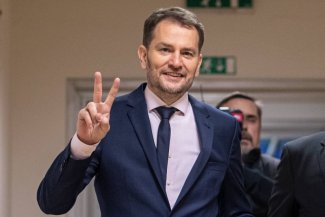Slovakia: the end of Smer’s rule, the triumph of Igor Matovič

The parliamentary elections in Slovakia held on 29 February were won by Igor Matovič’s grouping Ordinary People and Independent Personalities (OĽaNO). It received 25% of the vote, and will be the major force in the new government coalition, which will contain groups with right-wing roots. The Smer - Social Democracy party, which has governed Slovakia since 2006 (with a break in 2010-12) will go into opposition, and its coalition partners are now no longer represented in the parliament. The opposition liberals of the left-centrist Progressive Slovakia/Together (PS/Spolu) alliance also have no seats. While last year their candidate Zuzana Čaputová won the presidential election and then they won the elections to the European Parliament, this time the group failed to clear the 7% threshold for electoral coalitions. Also, for the first time the parliament will have no groups representing Slovakian Hungarians (who account for over 8% of the population); the nationalists and Christian Democrats also failed to clear the 5% threshold. Almost a third of the votes cast went to groups which will not be represented in parliament. Due to the high level of public interest, the turnout was the highest in 18 years (65.8%; 6 percentage points higher year-on-year).
The end of Smer’s rule
The campaign’s main theme was the need to cleanse the state of the unhealthy ties between politics and the worlds of business & criminality, and to counteract the corruption which in the eyes of most voters was symbolised by Smer and its coalition partner the Slovak National Party (SNS). The latter has now lost all its seats in parliament after these elections. A similar fate befell another of the former government’s coalition partners: Most-Híd has paid the political price for endorsing the government of Smer and the SNS, and has lost its position as the main group representing Slovakian Hungarians. A weakened Smer has lost the coalition potential which would have allowed it to stay in power. The party won 18.3% of the votes, 10 percentage points down from its 2016 share (it only won less on its debut in the 2002 elections), which means it was unable to restore its position after numerous scandals. After the murder of investigative journalist Ján Kuciak in 2018, which shook Slovak public opinion, Robert Fico resigned as prime minister in favour of Peter Pellegrini, who enjoyed more confidence in society. This probably prevented a further decline in its support. Smer presented itself as a guarantor of stability and a generous social policy, and kept the votes of its most faithful electorate, especially in the east of the country.
Matovič’s long march
Igor Matovič (born 1973) started his political career in 2010, and he made anti-corruption his slogan from the outset. Before entering politics he was a businessman, operating mainly in the media industry (his former company was the leader on the Slovak regional press market). His political group was constructed not as a party, but as a protest movement (Ordinary People and Independent Personalities, Obyčajní ľudia a nezávislé osobnosti) which did not have complex internal structures. It gained popularity thanks to its vivid demonstrations directed against corruption and abuses of power, but also won the reputation of being an unstable group led by an unpredictable leader. Matovič presented himself as a supporter of the expansion of direct democracy and the abolition of administrative burdens for entrepreneurs.
Although OĽaNO improved its results in the previous two parliamentary elections (8.5% in 2012 and 11% in 2016), it only became the leading opposition party just before these elections. Thanks to his attacks on Smer, which garnered media attention, Matovič caught the mood of the country after Kuciak’s assassination, presenting himself as an authentically anti-establishment activist. Like most of the opposition, he promised to settle accounts with the country’s political leaders and influential financial groups, and to reform the judiciary. He turned out to be more trustworthy than his many competitors; for reasons including the clarity of his message, he proved able to attract voters who had been alienated from politics, as well as the protest electorate.
The public conviction of widespread corruption and its lack of trust in the state has been confirmed by data from Transparency International, among others. In its Corruption Perceptions Index Slovakia places sixth worst in the EU; and according to Eurobarometer, only 24% of people in Slovakia believe that their state can effectively prosecute crimes of corruption (for comparison, in Poland the figure is 62%). Judges are trusted to be independent by fewer than 30% of citizens (in the EU only Croatia recorded a worse result). Despite progress in the investigation into Kuciak’s murder, as well as a number of successes for the prosecution and the police, Smer did not regain public confidence. The measures which the government presented as evidence of the state’s increasing efficiency also served to expose more criminal ties between politics and business, in which representatives of the judiciary and the law enforcement agencies were also involved.
Information about these criminal networks also concerned members of various political parties; in the eyes of voters this meant not just Smer, but the political class as a whole were responsible (two days before the election Pavol Rusko, who had served in the centre-right Mikuláš Dzurinda government as a deputy prime minister and economy minister, was sentenced to 19 years’ imprisonment). During the campaign, opposition politicians and the media spoke ever more frequently about the need to liquidate the ‘mafia state’ and recover a state which had been ‘stolen’ by Smer and the oligarchs; but the most convincing rhetoric on this matter came from Matovič, who has attacked politicians for years and has never been in government.
The failure of Smer and the government of Peter Pellegrini, and Matovič’s simultaneous success, were also influenced by the crises in Slovakia’s health care and education systems. Opinion polls show that these – beside corruption – are the most pressing issues for Slovaks. Although Smer stated that the root of the health service’s problems lay in its partial privatisation during the period of centre-right government rule, Smer did not improve the situation during its time in office. There is also a serious understaffing crisis (around 3000 doctors and 10,000 nurses more are needed), and the money from the more profitable parts of the sector has gone to the Penta financial group. Matovič, criticising the corruption associated with Penta and other financial groups, was more credible to an electorate which was disillusioned not only with Smer, but also with the centre-right and the country’s entire political elite.
The campaign’s final phase, and winning over the protest electorate
Much indicates that Matovič and his message reached not only those people who were discouraged with all politics and had not voted before, but also the anti-system electorate. Even last autumn, support for OĽaNO stood at only 6%, rising to 10% this January. However, over the next few weeks its numbers rose significantly. Its campaign was influenced by the big jump in support for the People’s Party-Our Slovakia (ĽSNS) of Marian Kotleba – whose roots lie in neo-fascist movements - and whose ratings of from 10 to 14 per cent made it the second political force in the country. The sometimes hysterical media campaign, together with a wave of anti-fascist demonstrations whose aims included preventing post-election cooperation between Smer and Kotleba, could have led some anti-system voters to support Matovič’s party; he skilfully distanced himself from the protests while at the same time appealing to the anti-system electorate. After his party’s poll numbers improved, Matovič clearly moderated his attacks on other opposition parties towards the end of the campaign, and worked to present himself as a reliable future prime minister who was ready for cooperation, and to pick up the votes cast for the main party of change.
The ruling Smer party was also unable to inflict any serious damage on Matovič during its campaign, despite alleging that the opposition wanted to open up the country’s borders to mass immigration, liquidate government social spending projects and introduce liberal ideological solutions; Matovič did not argue with the government on these issues. As his group contains activists with both conservative and liberal views, and because he also appealed to a diverse, broad electorate, Matovič avoided ideological topics, announcing a status quo on these issues, but he also declared his ‘respect for Christian values’ (he describes himself as a Catholic). This message could also have resonated with those voters who had previously been inclined to support Čaputová as a symbol of the ‘new quality’ in Slovak politics. Despite the PS/Spolu coalition’s costly campaign and their favourable reception in many private media, the ‘Čaputová effect’ has burned out; the liberals, who had been lulled by this support, won only one of the country’s 79 constituencies, in downtown Bratislava. Meanwhile, especially in the provinces, they chose Matovič (whose party won in 50 constituencies). Their greatest tactical error lay in running as a coalition (the only such case in the 25 electoral lists), which meant they had to clear a higher electoral threshold (7%, as opposed to 5% for single parties). As a result, they failed to obtain any seats in parliament by a margin of less than 1000 votes (0.04%).
Forming of the coalition
Matovič said he would strive to create a broader coalition which would have a three-fifths constitutional majority of votes in parliament. To achieve this – by excluding Smer and Kotleba’s party – he needs to cooperate with the other three groups. A simple majority would give OĽaNO a coalition with two of its three potential stakeholders. These are political projects centred around their founders, but the party with the most similar profile to a traditional centre-right group is the Freedom and Solidarity group (Sloboda a Solidarita, SaS) led by Richard Sulík. This party has a distinctive free-market, Eurosceptic profile, and is ideologically liberal (Sulík has already declared that total conformity will not be a prerequisite for his party entering into a coalition). The We Are Family (Sme rodina) group, which has strongly pushed an anti-immigration agenda, has a more conservative and pro-social profile (building more housing, an amnesty for debtors). This de facto business project, led by the entrepreneur Boris Kollár, is distinguished (like OĽaNO) by a lack of complex internal structures, and in the previous parliamentary term it was notable for its considerable instability. The third group which Matovič could invite to a coalition is For the People (Za ľudí), which was founded by the centre-right ex-President Andrej Kiska as a party of ‘experts and personalities from the regions’.
Foreign and European affairs
Foreign issues have never been an important element of the OĽaNO programme. Their manifesto contained a declaration that the country’s pro-Western orientation would be cultivated through the ‘useful EU’ (emphasising the efficient use of European funds) and the ‘efficient NATO’ (as the main guarantor of Slovakia’s security). Matovič is capable of causing surprises by suddenly changing his opinion, for example by playing the anti-American card (which is popular in Slovakia), blaming the US for the ‘chaos in world politics’. Nonetheless, considering the Slovak political scene, he counts as a pro-Western politician, and his associates include advocates for strengthening trans-Atlantic cooperation and NATO. Matovič has said he would guarantee the country’s pro-Western and pro-EU orientation, but he has not so far revealed himself to be a politician with firm views on cooperation within Central Europe or relations with Poland. When he entered politics, he sharply criticised the actions Viktor Orbán had taken regarding Hungarians living abroad, but at the same time he also made an attempt at pre-election cooperation with the Hungarian minority’s main grouping, which has been supported by Budapest. Before the elections he suggested that he would not follow the ‘Polish or Hungarian way’, but in his party manifesto he announced closer cooperation with ‘[Slovakia’s] most important political and economic partners,’ referring to the Visegrad Group, Germany and France. The fundamental reforms to the judiciary and the public prosecution which he has announced, with the aim of purging them of their criminal links, may however cause protests from those affected, and thus draw Brussels’ attention – to which the expected activities of Smer in opposition will also contribute.
Prime Minister Matovič will probably focus on domestic policy. From his initial moves, it appeared that the liberals in the government were to deal with international and European issues, which would have eased cooperation with President Čaputová and ensured a good reception for the new government in Brussels and the capitals of Western Europe. While it is no longer possible because they failed to cross the electoral threshold, a similar effect could be achieved by handing the Ministry of Foreign and European Affairs to the For the People group. Their minister would probably continue the existing policy, oriented towards Berlin and Paris, and would try to position Slovakia as a country more integrated into the EU (as a member of the euro area) than its partners in the Visegrad Group, perhaps with greater concern for Slovakia’s credibility as a partner in trans-Atlantic cooperation. Nevertheless, the prime minister and his entourage, who are aware of the electorate’s expectations, may pay more attention to cooperation in Central Europe. Consequently, this division of tasks in Slovakian politics would be maintained, and the country’s current European foreign policy would continue.
Annex.
The election results, along with the allocation of seats in parliament






